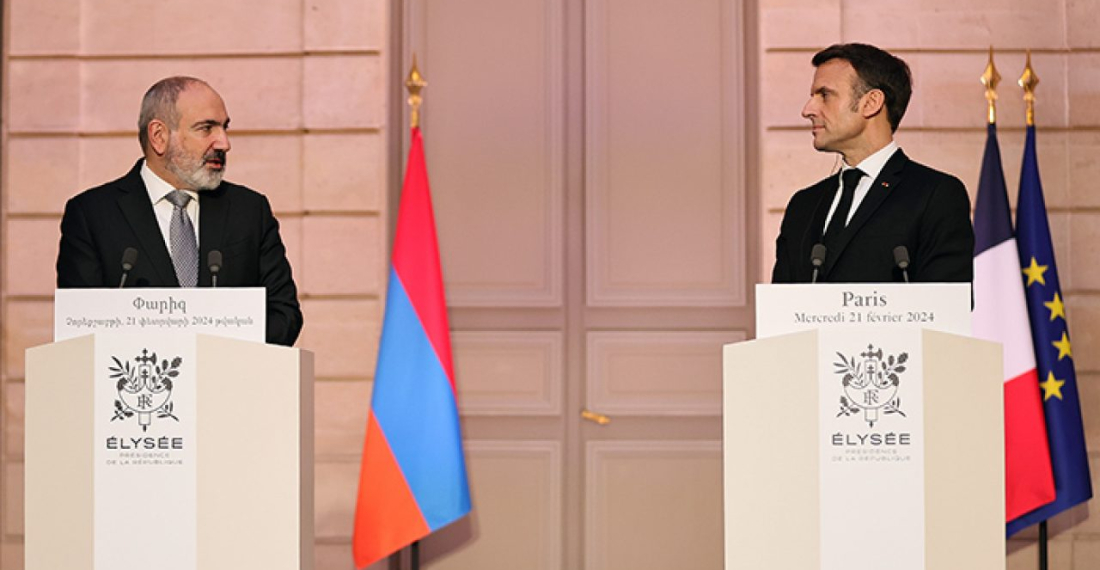In an interview with France24 during his February 2024 visit to Paris, Nikol Pashinyan highlighted Azerbaijan's perception of Armenia as "Western Azerbaijan" and expressed concerns about Azerbaijan's preparations for a new war, writes Dr. Anzhela Mnatsakanyan in this op-ed for commonspace.eu. "This interview marked a significant departure as Pashinyan openly scrutinized Russia's policies towards Armenia and hinted at the possibility of a new war. The timing of this interview, a few days before Azerbaijan presented a re-edited version of the so-called "Peace treaty," suggested that the "peace" offered by Azerbaijan is more about the capitulation of Armenia. This interview was a kind of “call for help” from Pashinyan to Western countries on the eve of a possible new war."
What established the asymmetrical partnership between Russia and Armenia? What are the drivers for its Eurasian choice? Armenia’s position towards Russian initiatives was framed by the country’s key security problem, the Nagorno-Karabakh conflict, which has pushed Yerevan toward Russia. The “strategic partnership” between Moscow and Yerevan is completely unequal, and arises in a “3G” form, with Armenia as a recipient of guns and other weapons; gas supplied at beneficial rates; and goods, as both a major trading ally and with Russia as the primary destination for Armenian migrant labour.
After Azerbaijan seized Nagorno-Karabakh, Armenia started to show signs that the country was moving away from Russia’s security umbrella and here France ramped up very quickly the role of Armenia’s possible next strategic partner.
After the Munich Security Conference, Nikol Pashinyan, Prime Minister of Armenia embarked on a two-day working visit to France alongside his wife, Anna Hakobyan. During his time in Paris, Pashinyan engaged with President Macron, and Senate representatives, and partook in the burial ceremony of WWII resistance fighter, Misak Manushyan and his wife at the Pantheon, a momentous event imbued with political significance. This ceremony served as a platform for France to explicitly convey its unwavering support to Armenia.
France strategically sought to underscore the French people's stance towards Armenia, emphasizing the historical importance of the Armenian Community in France. Pashinyan held discussions with leaders of French business, expressing his interest in fostering French business initiatives in Armenia. Noteworthy was Pashinyan's meeting with Anne Hidalgo, the Mayor of Paris and a speculated candidate for the next French Presidency. Hidalgo's prior humanitarian efforts during the Nagorno-Karabakh blockade and her visit to bordering areas of Armenia added a layer of significance to their interaction. Additionally, Pashinyan engaged with the new Prime Minister of France, focusing their discussions on economic collaboration, energy, water resources, and tourism.
A pivotal moment in this diplomatic venture was Prime Minister Pashinyan's interview with French 24, where he conveyed critical messages. Pashinyan highlighted Azerbaijan's perception of Armenia as "Western Azerbaijan" and expressed concerns about Azerbaijan's preparations for a new war. He underscored President Aliyev's reluctance to sign a peace agreement based on the recognition of territorial integrity, emphasizing an arms race initiated by Azerbaijan. Pashinyan also addressed Armenia's frozen participation in the Collective Security Treaty Organisation (CSTO) and raised issues concerning the Russian military base in Armenia. Notably, he disclosed Moscow's alleged encouragement of Armenians to initiate a revolution against the government, attributing it to propagandist efforts directed personally at him. Furthermore, Pashinyan discussed the activities of Russian servicemen in Armenia and the arrest of Dmitry Setrakov in Armenia by the Russian military police.
This interview marked a significant departure as Pashinyan openly scrutinized Russia's policies towards Armenia and hinted at the possibility of a new war. The timing of this interview, a few days before Azerbaijan presented a re-edited version of the so-called "Peace treaty," suggested that the "peace" offered by Azerbaijan is more about the capitulation of Armenia. This interview was a kind of “call for help” from Pashinyan to Western countries on the eve of a possible new war.
Simultaneously, as Pashinyan returned to Armenia, French Armed Forces Minister Sébastien Lecornu arrived to Armenia to personally deliver defence weapons. The arms agreement, initiated in October 2023, materialized in February 2024 with the arrival of weapons in Yerevan. This development contrasted starkly with Armenia's prior attempts to purchase weapons from Russia, where only a limited quantity arrived after a bid submission in 2020. The visit of Minister Lecornu and the discussions with Armenian Defence Minister Suren Papikyan underscored the deepening defence links between France and Armenia. An agreement was reached for the French Army to conduct three mountain combat training sessions in Armenia in 2024. Worth noting is Armenia's withdrawal from hosting CSTO exercises in 2023, indicative of the evolving dynamics in its defence relationships.
On the whole, in Armenia there is a lack of trust in Russia. Armenians feel betrayed by Moscow after Azerbaijan launched an offensive to retake the breakaway Armenian-inhabited region of Nagorno-Karabakh in September. Russia had a peacekeeping contingent stationed there, which stood aside and didn't interfere. Trends in public opinion also impose certain constraints on policymaking in Armenia.
At the same time, CSTO leaders have demonstrated a repeated propensity to shoot themselves in the foot. This pattern is exemplified by President Aleksandr Lukashenko of Belarus, who unequivocally stated that in the event of a conflict between Armenia and Azerbaijan, CSTO members would refrain from intervention. This stance directly contradicts the principles outlined in the CSTO charter. Lukashenko's position seems to be influenced by the perception that Azerbaijan is considered an allied nation by the CSTO member countries, except of course by Armenia.
On the eve of a new possible war, while dialogue with Moscow remains almost completely nonproductive, Armenia needs to find allies, and we can only hope that Yerevan will not overestimate the quality of the cards it is playing in Europe.







